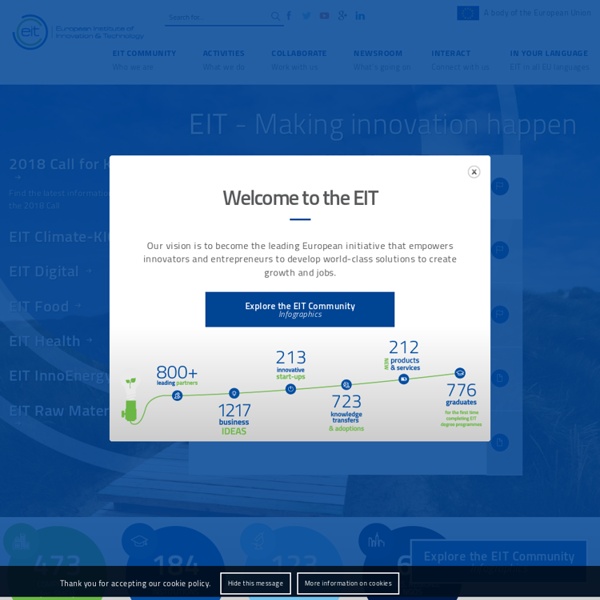



My Research in a Nutshell The human species can be defined by its special ability to manipulate symbols. Each great augmentation in this ability has brought enormous economic, social, political, religious, epistemological, educational (and so on) changes. I think that there has been only 4 of these big changes. The first one is related to the invention of writing, when symbols became permanent and reified. The second one corresponds to the invention of the alphabet, indian numerals and other small groups of symbols able to represent “almost everything” by combination. The third one is the invention of the printing press and the subsequent invention of electronic mass media.
CIP COSME 2014-2020 Additional tools What is COSME? COSME is the EU programme for the Competitiveness of Enterprises and Small and Medium-sized Enterprises (SMEs) running from 2014 to 2020 with a planned budget of €2.3bn. COSME will support SMEs in the following area. Regulation establishing COSME 2014-2020 Programme ICT Partner Search Network The ICT NCP Network - active since 1996! Ideal-ist is an international ICT (Information and Communication Technologies) network, with more than 70 ICT national partners from EU and Non-EU Countries, such as Associated States, Eastern European Partner Countries (EEPC) and Mediterranean Partner Countries (MPC) and emerging countries like China, Brazil, India, and South Africa. Ideal-ist offers high expertise in proposal writing and project management : A network of over 65 National Contact Points (NCPs) in the ICT theme and organisations appointed by them are supporting proposers.long-standing experience in EU Framework programmes (Ideal-ist was established 1996)a unique quality labelled partner search tool to connect newcomers and experienced researchersan international Quality team to support proposer e.g. to better focus proposalsIdeal-ist information services : Newsletter, press releases, Work Programm informationBrokerage events to pre-schedule meetings at big events
EIT Foundation The EIT Foundation Work Programme reflects the Foundation's determination in promoting the development of people's innovation and entrepreneurial skills, and the dissemination of innovative practices across Europe. It combines a strategic approach in the definition of the medium to long-term priorities, with an operational approach through the identification of targeted actions to be implemented in the short to medium-term. The EIT Foundation Work Programme is proposed, managed, financed and implemented directly by the EIT Foundation community. It focuses on the promotion of: Entrepreneurial education and bridging the gap between academia and business.
Let The Network Do The Work One of the most striking things I see when watching organizations make the transition from legacy industrial models of working to new network-based models, is that we keep trying to employ the new tools and ideas in the same old ways. Certainly, it’s quite hard to unlearn the old methods, so deeply instilled are they by prior experience, history, and momentum. But as businesses, even today, we largely still try to create all the ideas, try to control everything, and focus on doing all the work to produce outcomes within the organization, team, or enterprise, with a little help of perhaps a few closely held suppliers and business partners. In short, most organizations still have an out-dated and overly centralized model for working, and it’s turned out to be a very difficult habit to break. If I have a single key lesson that every organization seeking to digitally transform must learn it’s this: You must let the network do the work.
DG Recherche & Innovation Display outside the DG's building The Directorate-General for Research and Innovation, informally DG Research and Innovation, is a Directorate-General of the European Commission, located in Brussels, and responsible for, notably, the European Union's research policy and coordination of research activities.[1] It is headed by Commissioner Máire Geoghegan-Quinn and Director-General Robert-Jan Smits. The Directorate General’s mission is evolving as work on the European Research Area (ERA) continues. Going Beyond ‘Bolt-On’ Digital Transformation Much has been made recently of the imperative to fully transition our businesses into the modern digital world. It now hardly needs to be said at this point. There is even some encouraging news for traditional enterprises: The latest data from Forrester shows that companies are indeed at long last making digital transformation a top priority, with 74% of executives saying that they currently have a strategy to get there. Yet “having a digital strategy” can also mean just about anything, depending upon who you ask. At this point however, there are basically two main forks in the road to digital for most organizations: There is the ‘bolt-on’ strategy, which typically means adding a few new digital channels to existing touchpoints — typically social and mobile — and maybe creating an associated but minor sideline business with some digital revenue.
CitizenSqKm Funding Institution: European Commission (CONFINE)Team at IGOPnet: Mònica Garriga, Mayo Fuster Morell (IP) and Joan Subirats. CitizenSqKm is a Social Augmented Reality experience for engaged communities, designed by Itinerarium, and a research project based on experimentation, led by IGOPnet. It has been selected to participate in the European Union project CONFINE to research on community-owned telecommunications networks. CitizenSqKm has selected a square kilometer of the city of Barcelona, Poblenou, where to perform the experiment.